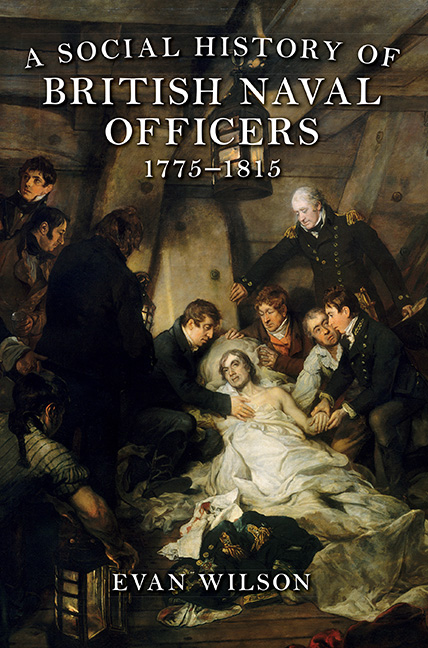Book contents
- Frontmatter
- Dedication
- Contents
- List of Illustrations
- Acknowledgements
- Abbreviations and Conventions
- Introduction
- 1 The Education of Young Gentlemen
- 2 Commissioned Officers’ Careers
- 3 Warrant Officers’ Careers
- 4 The Wardroom as a Social Space
- 5 Patronage and Promotion Prospects
- 6 Pay and Prize Money
- 7 Domestic and International Comparisons
- 8 Naval Officers’ Social Status
- Conclusion
- Appendix
- Bibliography
- Index
5 - Patronage and Promotion Prospects
Published online by Cambridge University Press: 20 April 2017
- Frontmatter
- Dedication
- Contents
- List of Illustrations
- Acknowledgements
- Abbreviations and Conventions
- Introduction
- 1 The Education of Young Gentlemen
- 2 Commissioned Officers’ Careers
- 3 Warrant Officers’ Careers
- 4 The Wardroom as a Social Space
- 5 Patronage and Promotion Prospects
- 6 Pay and Prize Money
- 7 Domestic and International Comparisons
- 8 Naval Officers’ Social Status
- Conclusion
- Appendix
- Bibliography
- Index
Summary
By the time the sun set on 15 June 1780, Edward Pellew, in what should have been a moment of triumph, was distraught. His commanding officer, Captain Philemon Pownoll, had just been killed by a shot fired from a French privateer. Pellew – future admiral and viscount, recipient of the Grand Cross of the Order of the Bath, commander-in-chief of the East Indies station, hero of the shipwreck of the East Indiaman Dutton, and commander of the Bombardment of Algiers – was convinced that his career was over. Pownoll had been Pellew's patron, and, since Pellew had no relatives or other connections of any note in government or in the navy, he feared that he would never progress past being first lieutenant of Apollo, a thirty-two-gun frigate. He later wrote to the First Lord of the Admiralty, Earl Sandwich:
The ship's company have lost a father. I have lost much more, a father and a friend united; and that friend is my only one on earth. Never, my Lord, was grief more poignant than that we all feel for our adored commander. Mine is inexpressible. The friend who brought me up, and pushed me through the service, is now no more!
Two factors prevented Pellew's career from stagnating. First, he took command of Apollo during the height of the action in which Pownoll was killed and brought it to a successful conclusion, driving the French privateer ashore. She was later recovered and bought by the navy; more importantly for Pellew, he was promoted to commander and immediately given the sloop Hazard. Sandwich made the reasons for Pellew's promotion explicit: ‘as a reward for his gallant and officer-like conduct’. Second, Pellew was clearly a talented and driven commander, likely to capture valuable prizes and reflect well on any powerful patron. Lord Falmouth, an eminent Tory politician closely connected to Pownoll and Pellew's community in Cornwall, quickly stepped into the patronage void, and Pellew was made post by the end of the American War. His career was no longer in jeopardy.
- Type
- Chapter
- Information
- A Social History of British Naval Officers, 1775-1815 , pp. 105 - 130Publisher: Boydell & BrewerPrint publication year: 2017



